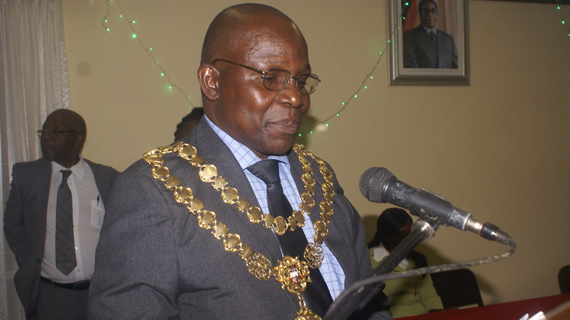
THE YEAR 2014 was a difficult year for the Bulawayo City Council, with residents, commerce, industries and stakeholders owing more than $90 million in unpaid rates, leading to poor service delivery, mayor Martin Moyo said. PRIVILEGE SHOKO OWN CORRESPONDENT
In his New Year message, Moyo said the local authority was owed $90 million by consumers.
“Bulawayo City Council faced many challenges in the year 2014 and notable strides were made in addressing these challenges and improving municipal service delivery,” he said.
“On January 1 2014 the city was owed $77, 2 million.
“This figure ballooned to $90 million as at the end of the year and this is compounded by consumers failing to settle their indebtedness to council thereby compromising service delivery.”
Moyo said the Harare High Court ruling of not disconnecting water without a court order immensely affected the local authority’s collection of revenue.
“Due to the economic squeeze that saw some companies folding resulting in unemployment, the Harare High Court ruling prohibited Local Authorities from disconnecting water without a court order adversely affecting the city’s revenue collection,” he said.
Moyo said as a result of insufficient cash collected by the local authority, the council could not fully deliver services to the public.
- Chamisa under fire over US$120K donation
- Mavhunga puts DeMbare into Chibuku quarterfinals
- Pension funds bet on Cabora Bassa oilfields
- Councils defy govt fire tender directive
Keep Reading
“The local authority requires an average of $7,2 million per month for the provision of basic services,” he continued.
“We only managed to collect an average of $5 million as opposed to $6,5 million for the same period in 2013,” he said.
“Council approved a standstill budget of $103 762 104 for year 2014.
“Actual income and expenditure up to November 2014 amounted to $84 250 331 and $75 572 801 respectively.”
He said the local authority has continued to nurse a one-month backlog of remuneration to employees due to diminished cash inflows.
“Salary creditors’ balances have also risen and this has seen the local authority entering into payment plans with creditors,” he said.
Moyo said the local authority faced challenges in sewer collapses as there were inadequate materials, plant and equipment to tackle some occurred due to obsolete infrastructure.
“While council continued to battle with sewer collapses, notable works were done and the local authority obtained borrowing powers to the tune of $13,2 million for sewage reticulation projects,” he said.
Moyo said refuse collection was a major challenge, as the council had a shortage of vehicles.
“Council operated with five reliable vehicles and the remaining 17 required constant mechanical attention,” he said.
“Planned acquisition of two refuse compactors in 2015, will bring slight improvement in the city’s refuse management.”
Moyo said the shortage of manpower was the major challenge hindering provision of effective and quality fire and ambulance service delivery.
“Financial constraints were also a challenge that hindered such major developments as construction of a fire and ambulance sub-station in Cowdray Park,” he said.
“Inadequate staff, coupled with a depleted fleet of ambulances to adequately cover the entire city and its surroundings also affected the service.”
However, the year saw an improvement in the city’s water supply situation due to rain received at the beginning of the year.
“The rainfall received at the beginning of the year boosted the volume of water supply leading to the commissioning of Umzingwane and Upper Ncema, which had been decommissioned in 2013,” he said.
“This resulted in the removal of the water-shedding scheme introduced in 2012, which initially started with a 48-hour period per week and resulted in 72 hours per week in 2013.”
Moyo advised residents to pay for municipal services for the year 2015 and help rebuild Bulawayo.










